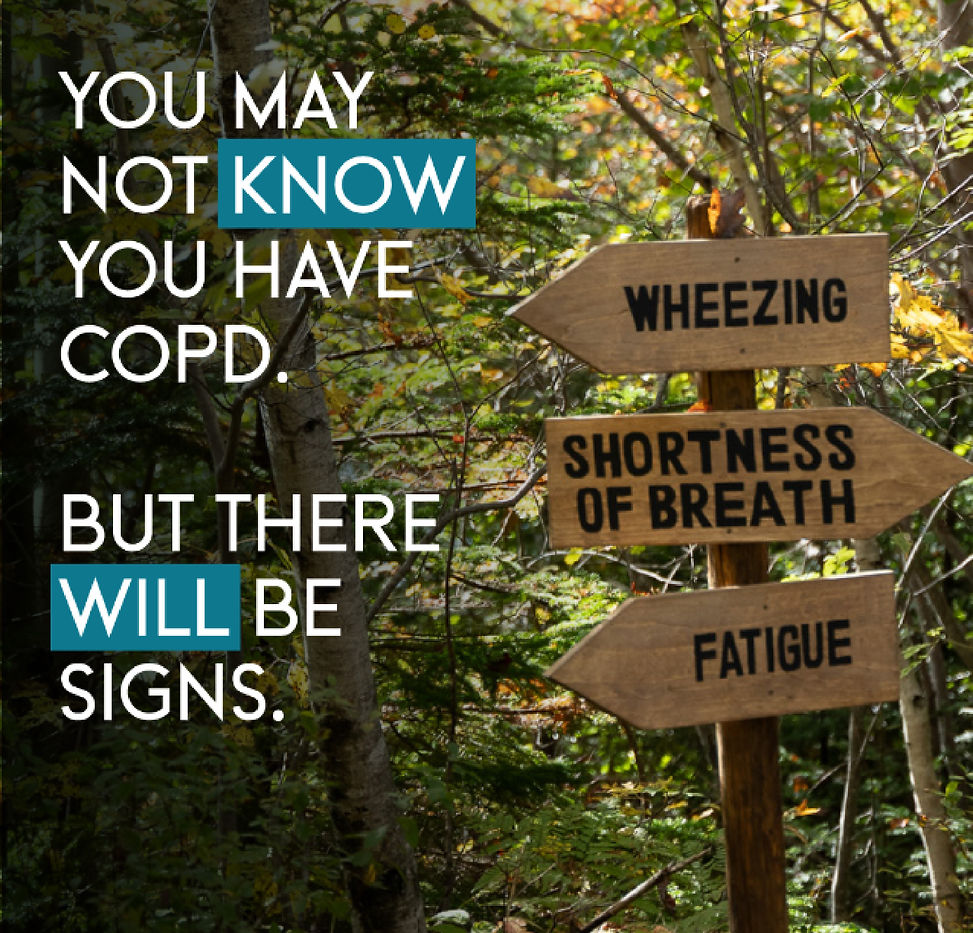



Shortness of Breath is NOT normal.
Chronic obstructive pulmonary disease (COPD), which includes chronic bronchitis and emphysema, is a long-term lung disease that makes it hard to breathe. If you experience any of these symptoms, you should contact your doctor about potentially getting a spirometry test (a common test used to check how well your lungs work). Getting a proper diagnosis can help with treatment and reduce the risk of symptoms progressing.
POTENTIAL SIGNS OF COPD (any or all of the following):
-
Cough with mucus/phlegm that you’ve had for a long time (for three months or longer at a time for at least two years).
-
Difficulty taking a deep breath (chest tightness)
-
Shortness of breath, especially when performing daily activities or with mild exertion
-
Wheezing or other lung sounds
-
Fatigue or tiredness
-
Barrel-shaped chest
-
Bluish skin (cyanosis)

Getting Tested For COPD
If you or your loved one is experiencing any symptoms of COPD, you should talk to your doctor or healthcare provider about getting tested for COPD with a simple spirometry test.
There Are Resources Available For People With COPD
In Nova Scotia:
Pulmonary Rehabilitation Programs
INSPIRED COPD Outreach Program
Chronic Disease Management Centre
In Prince Edward Island:
Pulmonary Rehabilitation Programs
Reducing the Stigma Surrounding COPD
Because COPD is often associated with smoking, many people with the condition feel a sense of shame, believing they caused their illness. This can lead to insufficient symptom management. However, there are ways to reduce the impact of stigma and improve quality of life if you or someone you care about is living with COPD:
-
Build a support network: Connecting with others can ease feelings of isolation and provide access to useful resources. LungNSPEI's Living Well With Lung Disease program, for example, offers opportunities for both virtual and in-person connections, where shared experiences can foster a sense of community.
-
Raise awareness: Talking to others about the challenges of COPD can help dispel harmful misconceptions and break down the stigma surrounding the disease.
People with COPD deserve proper care and symptom management, allowing them to live their best life possible.
Risk Factors For COPD
-
Smoking is the main risk factor for COPD, responsible for 80–90% of cases
-
A history of childhood respiratory infections
-
Smoke exposure from coal or wood burning stove
-
Exposure to secondhand smoke
-
People with a history of asthma
-
People who have underdeveloped lungs.
-
Exposure to dusts, fumes, and chemicals in the workplace
-
Exposure to outdoor air pollution
-
Those who are age 40 and older as lung function declines as you age
-
A genetic deficiency of alpha-1-antitrypsin, an anti-protease that protects lung tissue, can increase the risk of COPD
-
People with a family history of COPD are more likely to develop the disease if they smoke.
Share Your Story
We want to hear from you! If you’ve been impacted by COPD, whether through your own diagnosis or caring for someone with the disease, your story can inspire and inform others. Share your experience with COPD and how spirometry testing played a role in your diagnosis or treatment journey. Your insights can help raise awareness and encourage others to take control of their lung health. Simply fill out the form below to tell us your story and join our efforts to make a difference!
.jpg)
